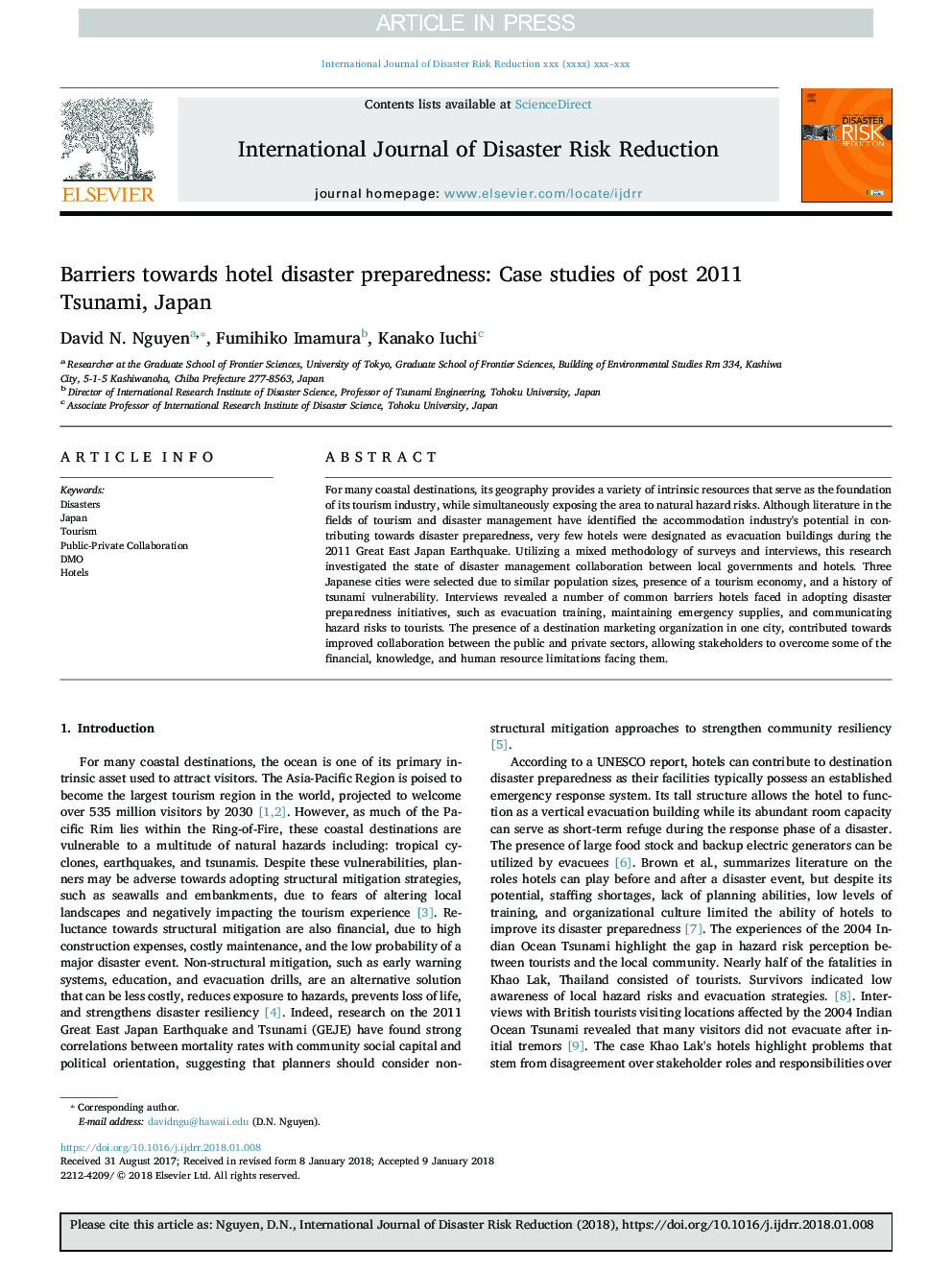| کد مقاله | کد نشریه | سال انتشار | مقاله انگلیسی | نسخه تمام متن |
|---|---|---|---|---|
| 7471712 | 1485142 | 2018 | 10 صفحه PDF | دانلود رایگان |
عنوان انگلیسی مقاله ISI
Barriers towards hotel disaster preparedness: Case studies of post 2011 Tsunami, Japan
ترجمه فارسی عنوان
موانع پیش روی آمادگی برای فاجعه هتل: مطالعات موردی پس از سال 2011، سونامی ژاپن
دانلود مقاله + سفارش ترجمه
دانلود مقاله ISI انگلیسی
رایگان برای ایرانیان
کلمات کلیدی
ترجمه چکیده
برای بسیاری از اهداف ساحلی، جغرافیای آن انواع منابع ذاتی را فراهم می کند که به عنوان پایه و اساس صنعت گردشگری آن تأثیر می گذارد در حالی که همزمان این منطقه را به خطرات خطر طبیعی منتهی می کند. اگرچه ادبیات در حوزه گردشگری و مدیریت بلایا توان بالقوه صنعت مسکن را برای کمک به آمادگی بلایای طبیعی مشخص کرده است، اما تعداد کمی از هتل ها در طول زلزله ژاپن بزرگ ژاپن در سال 2011 به عنوان ساختمان تخلیه شناخته شده اند. با استفاده از متدولوژی ترکیبی نظرسنجی ها و مصاحبه ها، این تحقیق وضعیت همکاری مدیریت بحران ها بین دولت های محلی و هتل ها را مورد بررسی قرار داد. سه شهر ژاپن به دلیل اندازه جمعیت مشابه، حضور اقتصاد گردشگری و سابقه آسیب پذیری سونامی انتخاب شدند. مصاحبه ها نشان داد تعدادی از موانع مشترک هتل ها در تصویب طرح های آماده سازی فاجعه، مانند آموزش تخلیه، نگهداری وسایل اضطراری و ارتباط خطرات خطر برای گردشگران. حضور سازمان بازاریابی مقصد در یک شهر، به بهبود همکاری بین بخش های عمومی و خصوصی کمک کرد، به ذینفعان اجازه داد تا بر برخی از محدودیت های مالی، دانش و منابع انسانی مواجه نشوند.
موضوعات مرتبط
مهندسی و علوم پایه
علوم زمین و سیارات
فیزیک زمین (ژئو فیزیک)
چکیده انگلیسی
For many coastal destinations, its geography provides a variety of intrinsic resources that serve as the foundation of its tourism industry, while simultaneously exposing the area to natural hazard risks. Although literature in the fields of tourism and disaster management have identified the accommodation industry's potential in contributing towards disaster preparedness, very few hotels were designated as evacuation buildings during the 2011 Great East Japan Earthquake. Utilizing a mixed methodology of surveys and interviews, this research investigated the state of disaster management collaboration between local governments and hotels. Three Japanese cities were selected due to similar population sizes, presence of a tourism economy, and a history of tsunami vulnerability. Interviews revealed a number of common barriers hotels faced in adopting disaster preparedness initiatives, such as evacuation training, maintaining emergency supplies, and communicating hazard risks to tourists. The presence of a destination marketing organization in one city, contributed towards improved collaboration between the public and private sectors, allowing stakeholders to overcome some of the financial, knowledge, and human resource limitations facing them.
ناشر
Database: Elsevier - ScienceDirect (ساینس دایرکت)
Journal: International Journal of Disaster Risk Reduction - Volume 28, June 2018, Pages 585-594
Journal: International Journal of Disaster Risk Reduction - Volume 28, June 2018, Pages 585-594
نویسندگان
David N. Nguyen, Fumihiko Imamura, Kanako Iuchi,
